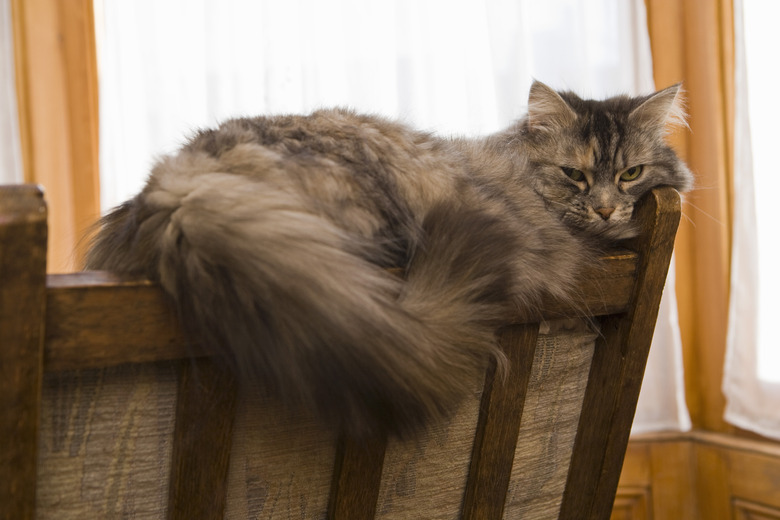Cat Hair Loss Home Remedies
Hair loss in cats can be as distressing and discomforting as in humans, and there are just as many causes. It can be poor diet, stress, allergies, fleas, mites, or just unknown, permanent hair loss, known as alopecia. Sometimes, the cat will lose patches of hair, while in other cases her hair may thin or fall out in big chunks. You can help stop your cat's hair from falling out by applying an effective flea repellant, bathing her regularly, and adding herbs to her bath that repel bugs, prevent dandruff, and soothe her skin.
Causes of cat hair loss
Causes of cat hair loss
One of the most common causes of cat hair loss is fleas, ticks, and mites. These tiny parasites force cats to bite and scratch excessively, resulting in hair loss. Often, cats are allergic to the bites, causing their skin to redden and itch and resulting in even more scratching and hair loss.
Another cause of cat hair loss is ringworm, a type of fungal infection. This infection occurs in the hair, the claws, and the outer layers of the skin. While some cats aren't affected by ringworm, in others it causes your cat to have hair loss in patches, particularly on the body, head, and ears. Ringworm is contagious to other pets, as well as to humans.
Hormone surpluses and shortages, like in humans, can also cause loss of hair in cats. Additionally, cats are like children in that they can be very sensitive to changes in their surroundings. The anxiety of moving or other stressful changes can cause hair loss.
Home treatment for cat hair loss
Home treatment for cat hair loss
An effective flea repellent for cats suffering hair loss due to parasites is a citrus solution. Cut a lemon in quarters and place the pieces in a pot of boiling water. Let this steep overnight. Spray over the entire cat, especially behind the ears, head, base of the tail, and in the arms. Garlic, brewer's yeast tablets, and apple cider vinegar all work as internal flea repellents. They all excrete smells or acids into the skin of the cat and make it an unfriendly environment for fleas.
A homemade spray called pyrethrum can be made from dried African chrysanthemum flower heads crushed into a powder. Pyrethrum is found in aerosol foggers and flea sprays. It is an organic and environmentally friendly insecticide proven to be safe for use on humans and animals. Crush the African chrysanthemum flower heads into a powder and place two handfuls of the powder into 1 liter of hot water for one hour. Puree the mix and pour it into a spray bottle. Spray all over the cat, taking care to avoid the eyes, mouth, and inside the ears.
Regular baths can help get rid of excess hair but use natural ingredients in the cat shampoo. Catnip is a cleansing herb that has also been found to repel and kill insects and their larvae. Chamomile added to a cat's bath can help reduce dandruff and promote healthy skin and coat and nettle can be used to encourage healthy skin and hair.
Cat hair loss prevention
Cat hair loss prevention
Diet can make a big difference in both preventing and treating hair loss in cats. A food high in protein, preferably salmon or turkey, is best. These meats offer the most digestible proteins for a cat. It can also be healthy to supplement a cat's diet with vitamins E and B.
Cats who spend time outdoors should be kept up to date with all vaccinations. Not only will this help keep away more serious, and sometimes fatal, diseases, it will also keep cats from experiencing illnesses that can be the root cause of hair loss. Also, keep them free of fleas and de-wormed.
